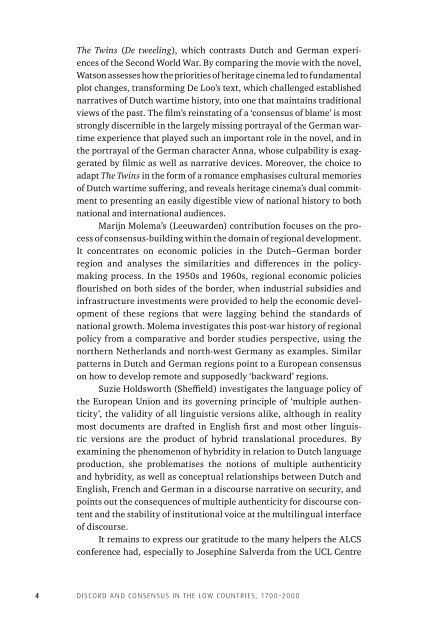Discord Consensus
7aze300jFJo
7aze300jFJo
Create successful ePaper yourself
Turn your PDF publications into a flip-book with our unique Google optimized e-Paper software.
The Twins (De tweeling), which contrasts Dutch and German experiences<br />
of the Second World War. By comparing the movie with the novel,<br />
Watson assesses how the priorities of heritage cinema led to fundamental<br />
plot changes, transforming De Loo’s text, which challenged established<br />
narratives of Dutch wartime history, into one that maintains traditional<br />
views of the past. The film’s reinstating of a ‘consensus of blame’ is most<br />
strongly discernible in the largely missing portrayal of the German wartime<br />
experience that played such an important role in the novel, and in<br />
the portrayal of the German character Anna, whose culpability is exaggerated<br />
by filmic as well as narrative devices. Moreover, the choice to<br />
adapt The Twins in the form of a romance emphasises cultural memories<br />
of Dutch wartime suffering, and reveals heritage cinema’s dual commitment<br />
to presenting an easily digestible view of national history to both<br />
national and international audiences.<br />
Marijn Molema’s (Leeuwarden) contribution focuses on the process<br />
of consensus-building within the domain of regional development.<br />
It concentrates on economic policies in the Dutch–German border<br />
region and analyses the similarities and differences in the policy-<br />
making process. In the 1950s and 1960s, regional economic policies<br />
flourished on both sides of the border, when industrial subsidies and<br />
infrastructure investments were provided to help the economic development<br />
of these regions that were lagging behind the standards of<br />
national growth. Molema investigates this post-war history of regional<br />
policy from a comparative and border studies perspective, using the<br />
northern Netherlands and north-west Germany as examples. Similar<br />
patterns in Dutch and German regions point to a European consensus<br />
on how to develop remote and supposedly ‘backward’ regions.<br />
Suzie Holdsworth (Sheffield) investigates the language policy of<br />
the European Union and its governing principle of ‘multiple authenticity’,<br />
the validity of all linguistic versions alike, although in reality<br />
most documents are drafted in English first and most other linguistic<br />
versions are the product of hybrid translational procedures. By<br />
examining the phenomenon of hybridity in relation to Dutch language<br />
production, she problematises the notions of multiple authenticity<br />
and hybridity, as well as conceptual relationships between Dutch and<br />
English, French and German in a discourse narrative on security, and<br />
points out the consequences of multiple authenticity for discourse content<br />
and the stability of institutional voice at the multilingual interface<br />
of discourse.<br />
It remains to express our gratitude to the many helpers the ALCS<br />
conference had, especially to Josephine Salverda from the UCL Centre<br />
4<br />
DISCORD AND CONSENSUS IN THE LOW COUNTRIES, 1700–2000


